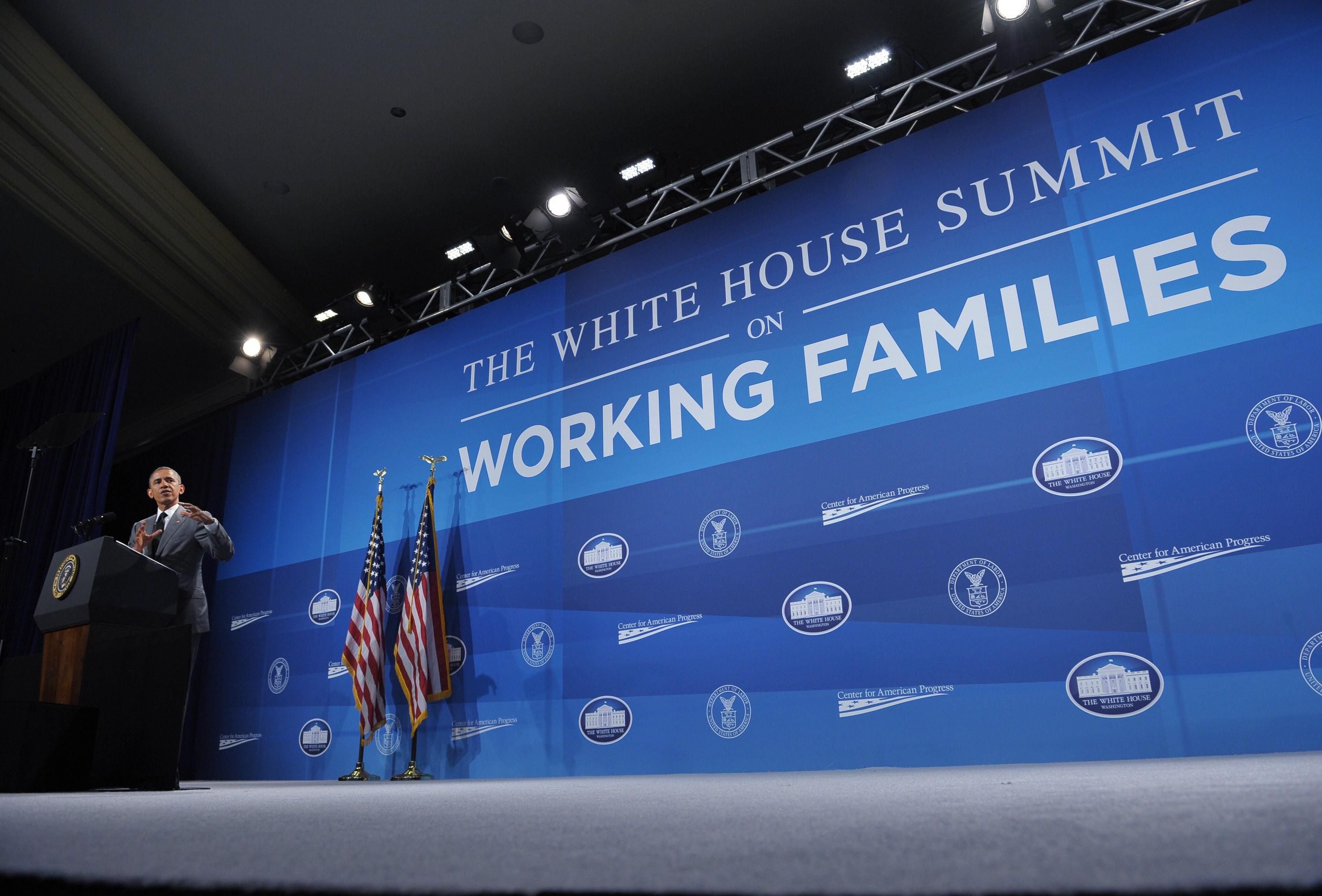President Obama held a big summit on Monday to tackle the problems of working families in the United States. Or, if not tackle, at least talk about them.
He—and Michelle Obama, who also spoke at the summit—deserve some credit for shining their considerable lights on policies that might help workers who are also caretakers, including paid parental leave, the right to request a flexible schedule, and workplace protection for pregnant women. Obama’s organizers and the Center for American Progress, which helped coordinate the summit, also deserve kudos for putting together a diverse set of panelists from the policy, business, and regular-person worlds (at least from what I saw on parts of the live stream on Monday—nearly 10 hours of video from the event is here).
But while the optics are important, the presidential memorandum Obama put out accompanying the event is disappointingly light on real policy. In it, he directs federal agencies to make good on existing flexibility initiatives, and he implements a “right to request” provision, which allows workers to ask for flexible working situations without fear of retaliation. The federal government has always been at the forefront of flexibility initiatives—some government workers have had access to compressed or flexible work weeks since the late ’70s—so the memo seems more about emphasizing existing policy rather than making a whole lot of new changes for federal workers.
To be fair, research has shown that there is an implementation gap when it comes to flexibility policies (at least in the private sector), which is to say, the flexibility policies exist in name, but workers are sometimes subtly or not-so-subtly discouraged from taking advantage of them. So if Obama’s memo fixes that for federal employees, that’s a good thing. But when you look at all the other issues that were discussed at the summit, making sure this particular policy gets implemented for just a few million workers (federal employees are at a nearly 50-year low) feels like a tiny step.
In a Huffington Post op-ed published this week, Obama talked about the “basic needs” that the U.S. does not provide its workers: paid sick days, paid caregiving leave, a decent minimum wage, affordable or subsidized child care (not to mention that nonfederal workers, except the ones in Vermont and San Francisco, still don’t have the right to request flexible or predictable schedules without retaliation). This is not just about maternity leave: Just a few Internet inches down from the New York Times article about the summit is a piece on how difficult it is for women in middle age to get back into the workforce after taking time out to care for sick parents or disabled children in need. So what is Obama doing about all of these issues, besides talking about them at a summit?
He’s called on Congress to pass the Pregnant Workers Fairness Act, which provides greater workplace protection for pregnant employees, and which the website Govtrack gives a whopping 1 percent chance of being enacted. This feels like the presidential equivalent of a child asking for a pony on her birthday. Obama has also supported the Federal Employees Paid Parental Leave Act, which has been introduced by Rep. Carolyn Maloney eight times since 2000. But that bill has a similarly low chance of being enacted with the current Congress. (The closest this bill got was passage in the House in 2009, but it stalled in the Senate.) Obama has given White House employees six weeks of paid leave, Stephanie Haven at McClatchy notes, so at least he practices what he preaches in his own house.
Unlike Republican who think this summit is just political posturing ahead of a difficult midterm election, I do believe the president’s intentions are good. His hands are tied by an intransigent Congress, despite the fact that even 73 percent of Republicans polled by the National Partnership for Women and Families support paid leave.
Of his memorandum, Obama said, “While we wait for Congress, I’m going to do what I can to act on my own.” He added that “Mayors, governors, state legislators, CEOS need to act.” And on some of these issues, there is hope on a local and state level—Oklahoma and Georgia now have universal pre-K; New Jersey, Rhode Island, and California have paid parental leave, and New York is considering it; and New York City and Connecticut have paid sick leave. The best possible result for the summit is that local and state legislators and activists feel a burst of support and greater awareness, because if we’re waiting around for the federal government to do anything, we’ll be waiting a very, very long time—at least 50 years, if you ask Gloria Steinem.
